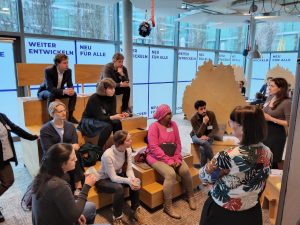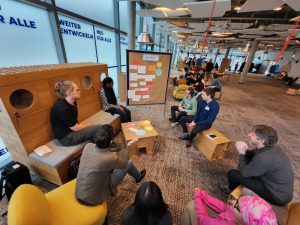
Academic retreats are serious business. They are not only about professional exchange on scientific questions, but also about overarching goals and strategies. It can be worthwhile to add new formats such as a World Café to the traditional retreat programme. The CatLab team tried this out.
“At expert meetings, we often find that people stay in their own groups. But we also wanted to get them talking to others and create a concrete opportunity to do so,” says Sophie Spangenberger from the Catlab retreat organisation team. So, in addition to the traditional programme with scientific sessions and workshops in small groups, a World Café on the morning of the second day was included.
How a World Café works

World Cafés have been used at NGO meetings for years as a way of quickly sharing knowledge, opinions, new ideas and approaches from a wide range of people. At the CatLab Scientific retreat, there were seven thematic stations: one on strategy and one on organisation and communication within the CatLab project, as well as five on specific scientific topics, each of which could be explored in more depth in afternoon workshops. At each station there were two experts, who acted as host facilitators giving a brief overview; then, they encouraged the guests to ask questions or provide ideas and suggestions. They also documented the results on provided pin boards. After exactly 20 minutes, the moderator Jörg Weiss from Congressa rang a bell and the participants found a seat at one of the other topic stations. There were four rounds in all.
Key ingredients: Right space and right topics

Professional moderation is just as important as the right space and the right topics. “People had very lively discussions, that was nice to see. And even the younger or more reserved participants got involved,” says Sophie. In her opinion, the venue was a crucial factor for the success of the that format. The conference hotel provided the so-called Play Cube, a large, bright room with colourful furniture that could be quickly arranged into loose groups. “It looks like a kindergarten,” said more than one participant, maybe sceptically at first. But the unconventional atmosphere helped in encouraging a playful mind and open discussion. “We thought carefully in advance about what we had to achieve on the morning of the second day. The World Café seemed to provide the ideal concept for it,” says Steffi Hlawenka, CatLab project coordinator. The lively discussion and the unusually high level of feedback show that it was worth the effort. An idea that perhaps other teams organising expert conferences and retreats might want to take up?
Webtipp:
Wikipedia gives a good first overview on new and inspiring conference formats such as Unconference.

